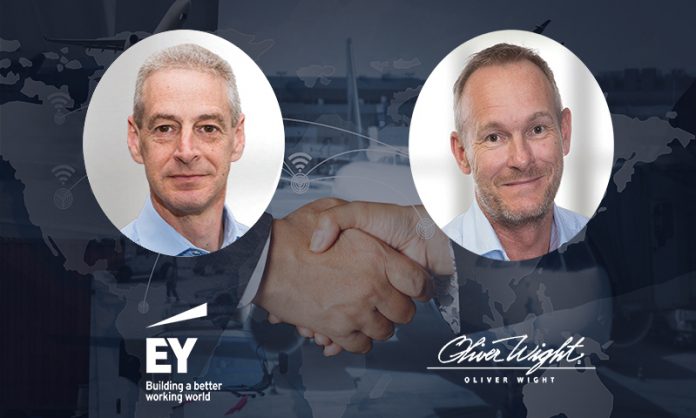A glimpse of Oliver Wight EAME’s alliance with Ernst & Young LLP
As the supply chain becomes more complex, there is a growing need for businesses of all kinds to have superior knowledge on how they would cope with current complexity levels. Today, organisations must be able to address rising customer demands, evolving market landscape and the pressure to have sustainable competitive advantage all while keeping innovation top of mind. In our interview with Les Brookes, CEO of Oliver Wight EAME, and Glenn Steinberg, EY Global and Americas Supply Chain Leader, they shared with us the key considerations for their alliance and what their partnership means for enterprises, particularly in their business planning, as well as their insights on the challenges, trends and opportunities shaping the future of supply chain.
Good day, Les and Glenn! Thank you for taking the time to talk to us. Let’s start this interview by giving us a glimpse of what your day looks like as successful industry leaders?
Les: Today, I started work at 6am CET with a review and feedback to a request from a CFO about how to support rolling financial plans in the context of moving away from traditional budgets, before taking breakfast with a customer. During the day, I am running a workshop with the senior team of a multinational who are setting the design criteria for their global IBP (Integrated Business Planning) process. For sure, this will be challenging but rewarding to see how they shape the future IBP process.
Glenn: My prime goal every day is to look after our people. I believe in the philosophy and practice of servant leadership. For me, this means I help remove barriers that may be inhibiting their success. I see who needs a “pick me up” and connect with them, and I congratulate those who are having successes. And I dedicate Friday afternoons to connecting with people who “touched me” during the course of the week. Sometimes it’s as simple as a call or an email to say “As I reflect on my week, I loved our conversation around (fill in the specific topic) and just wanted to get in touch and say ‘thank you.’” I believe this helps people feel appreciated and wanted.
Another daily goal is my focus on our clients and our delivery excellence. Delivery is the cornerstone of our business: this has always been true, and always will be. I ask myself if we are “wowing” our clients and if we are making a demonstrative impact to client shareholder value. Those are the essential elements of this particular focus.
Finally, every day I dive deeply into our solution development and market activation. We are always re-evaluating the needs of our clients, especially with the market changing so fast, and ensuring our solutions are directly addressing client needs. EY solutions bring together capabilities from across EY (EY Tax, EY Transaction Advisory Services, EY People Advisory Services, and more), as well as from our strategic alliance partners. The result is that we can ensure our solutions are backed by true assets – and are more than PowerPoint presentations.
As the CEO of Oliver Wight and the Supply Chain Leader of EY Global and EY Americas respectively, what excites you most about your role and the supply chain industry in general? What do you eagerly anticipate every single day?
Les: The most exciting thing for me is the opportunity the business now has and how we can support transformation for our clients. After 18 years in the consulting business, I still get a great buzz from helping people deliver change and improvement that benefits everyone.
Glenn: This is the perfect time to be a supply chain professional. For more than 25 years, we have been talking about visibility across the end-to-end supply chain process, so we can make better business decisions. Optimising the supply chain has always been about improving customer service levels while optimising costs and reducing working capital. What’s truly exciting is that now, with the proliferation of digital, we can actually do this!
What also excites me about my role is helping people grow and seeing them achieve their career goals and how that translates into their family lives. And I also love seeing our teams help clients achieve a step change and have a meaningful impact on shareholder value.
With your breadth of knowledge and experience in supply chain optimisation and business transformation, what’s the most interesting and significant development/trends you have witnessed thus far? What do you think is the next big thing in this industry?
Les: It’s becoming increasingly obvious that technology has taken another huge step with AI, modelling of data and predictive analytics to aid decision-making. Now, it provides business a real capability to reach for opportunities that were previously invisible to the naked eye.
Glenn: The digital revolution is powered by the Internet of Things (IoT) and fuelled by data, creating a fully interconnected society. In supply chain, we are moving from linear supply chains to networked value chains. This means that all relevant data reside in the cloud and events in the supply chain are seen by all companies in the partner ecosystem at the same time and can be worked simultaneously, rather than linearly.
Two items that stand out to me as mega disruptors in supply chains are additive manufacturing (also known as 3D printing) and blockchain (the latter is branded by EY as EY Ops Chain). I am very excited about the benefits these disruptors will deliver, in the long term.
Also, there is a huge shift in the perception of supply chains. They are no longer viewed as simply a “cost of doing business,” but as strategic differentiators. In fact, the timing for this shift in perception is a direct result of the digital disruption all around us. More than ever, supply chains must meet customer service levels at the lowest cost and with the highest operational efficiencies. To achieve those goals, organisations must be nimble, flexible and efficient, when it comes to their supply chains.
Besides this shift in perspective around the essential role of supply chains – which I believe is truly an exciting development – another exciting development is that companies are considering the potential for infusing new technologies into the supply chain process to create more efficiencies, reduce costs and vastly improve customer service. Think about machine learning for automated warehouses, or imagine a blockchain with a host of smart contracts that connect companies, manufacturers and suppliers on one platform. The possibilities are almost endless.
Just recently, you announced your partnership which accordingly is aimed at addressing organisation’s business planning challenges. What were the key considerations for building this partnership? Any particular project you are working on now that you can share with us?
Les: We have increasingly seen opportunities in working together with a number of clients, combining Oliver Wight’s thought leadership in Integrated Business Planning and EY’s capability in delivering enhanced optimisation and decision support analysis for a real Enterprise Business Planning (EBP) approach. It is the EBP opportunity, focussed on taking businesses far beyond their current performance that excites us most.
Glenn: The speed of change is unprecedented. The shelf life of a Fortune 500 company was 61 years in the 1950’s; it’s now about 18 years. Given this shift and speed of change, no one organisation can possibly have all the capabilities that it needs to effect the change that clients truly need and if they say they are fully equipped to manage the pace of change, they are simply not being honest.
We recognise the need for and value of strategic alliances. Basically, it’s a reflection of the ways in which society has become so interconnected. So, too, must businesses and consultancies become interconnected. That’s why we came together with Oliver Wight and other strategic alliances. It enables us at EY to bring the best of all worlds to serve our clients and commit to deliver a step change in value for our clients, which comes first – even before our companies’ individual profit and loss statements.
At the heart of it, our strategic alliance with Oliver Wight will help organisations address their planning challenges – like leveraging new technologies that bring efficiencies while requiring increased collaboration, new behaviours and culture change to work with more transparent data across the entire company. And all of these challenges are combined with rising customer demands, an evolving market landscape and the pressure to improve profit margin.
These challenges are a direct result of today’s considerable disruption in the way enterprises work, plan, execute and make decisions in their businesses. For example, implementing new technologies – like blockchain, intelligent automation or artificial intelligence – can provide efficiencies but typically require more collaboration, new behaviours and culture change. For enterprises to be competitive, it is essential for them to break down silos and drive end-to-end transformation across their business, which is the focus of the EY alliance with Oliver Wight. Working together, EY and Oliver Wight will focus on helping management teams use digital tools to assess their enterprise across the value chain, helping to improve their view of the supply chain and helping to enable them to develop plans that align markets, supply chain, operations and finance.
Companies today are exploring ways on how they could go from strength to strength and keep ahead of the changing business landscape. What are the most significant improvement enterprises can achieve by working with Oliver Wight and EY?
Les: Seeing beyond what they have previously seen as best practice by delivering a decision-making process and integration that far exceeds the old standards. This opportunity will support the changing customer/consumer landscape and truly keep organisations in front.
Glenn: The alliance will leverage Oliver Wight’s experience in its Sales and Operations Planning process and its Integrated Business Planning (IBP) model with the experience of EY in supply chain financial and commercial planning practices and digital capabilities.
Specifically, we’ll work together to develop the next generation of IBP, which is the business planning model for aligning demand, supply and product portfolio plans, helping businesses to allocate critical resources to satisfy their customers in the most profitable way. And we will leverage collaboration and technology to deliver end-to-end transparency in profitable decision-making, linking strategy to execution across an organisation.
What’s more, by working with EY and Oliver Wight, clients will gain access to innovation on how to better plan their company. This is a unique concept, with Enterprise Business Planning as the core of the next generation of decision-making processes. This capability leverages collaboration and technology to deliver end-to-end transparency in profitable decision-making, linking strategy to execution. Clients will also be able to tap into:
Broader, deeper capability, with complementary business and technical skills to our holistic client services.
Increased capacity, with increased speed of response to client requirements, leveraging resources from EY and Oliver Wight across a global footprint; and reduced complexity in managing multiple service providers.
In today’s fast changing market landscape, what do you think should organisations keep an eye on as they look to deliver more targeted and efficient services and drive bottom-line results?
Les: More than ever organisations should be looking at and understanding the customer, to ensure the business is optimised for a successful future rather than just managing the past and the near-term. The world is being driven by consumption, so understanding this and what it means in terms of portfolio, marketing and optimised supply chain response is a must. It’s something that together, we see as EBP.
Glenn: Organisations need to keep their eye on the financial supply chain. There is a convergence of events not seen since the opening up of manufacturing in China to the West. These events include United States tax reform, the United States’ administration’s trade rules, the European Union anti-dumping tariffs, Brexit, and more. So companies absolutely must re-examine their footprint and trade flows as supply chains are being impacted dramatically.
Next, they need visibility into their end-to-end supply chains. If they leverage this visibility in the right way, there will be a dramatic impact on their business, because it will enable them to react quickly to a changing environment. Increased visibility will ensure they have the necessary data and information to be confident to deliver enterprises’ future growth strategy, and improve their data and reporting capability to successfully drive their business using the latest intelligence. It will also allow them to align their operations with strategic planning, ensure that their cross functional planning processes are leading edge, and enable them to align their strategic, financial and operating plans.
As the world and businesses advance, there are changes in leadership style and focus. What do you think are the features of a remarkable leader today?
Les: As the world moves forward we have to question the value of some experience. Whilst leaders have traditionally got to that position on the basis of their understanding of past events, the leader of tomorrow needs to accept that business is about future planning and not just the historical outcome, and they must be able to interpret results from modelling different scenarios. It’s also key for them to drive the organisation towards horizontal structures focussed on value chains and outcomes, and remove any bias in behaviours, so that “the truth” is a given.
Glenn: It’s a simple list. I’ve already talked about my belief in servant leadership, which removes barriers that are inhibiting peoples’ success. I also believe it’s important to measure people on impact and kindness. I believe one should be real and authentic. It is also critical to be a great listener and empathetic, be visible and lead by example in the marketplace. And when things are down, it’s important to be transparent, while providing hope.
What’s your advice for the people who want to catapult their career forward in the supply chain industry?
Les: Take the opportunity to understand how processes can move from the traditional to the new world – this means accepting that many activities and roles that exist today would be replaced by bots. The smart supply chain leader can use this to their advantage; if they are willing to adapt, they can lead change by accepting and harnessing the power of technology.
Glenn: Be intellectually curious. There is a never-ending amount to learn, particularly at the pace of change we are seeing. Have a thirst for learning; it always serves one well. I would also advise people to be bold and take on challenges. Do work in logistics and manufacturing and planning and procurement. You will figure it out. Seeing how it all fits together will make you more valuable and marketable for yourself and your organisation.
Leaders atop a company naturally have a lot on their plate. What are your favourite routines to keep yourself focussed and healthy at and off work?
Les: For me its golf and relaxation, whenever I get the opportunity. I must say I also find it quite relaxing reading business-related books focussed on people and change.
Glenn: Start with outside of work. Making time for friends and family is extremely important as they can help bring perspective to things. Exercise is also extremely important. I believe in “Healthy Body, Healthy Mind”. I enjoy running and spinning on my Peloton.
Inside work, I have a routine to keep stress down. It enables me to focus on the tasks at hand. My routine involves getting into work early, before the phones and e-mail volume picks up. I lay out my day, and pull from my long list of to-do’s and create today’s to-do list. Today’s list must be a stretch – but achievable. This provides a sense of accomplishment at day’s end, compared with a never-ending to-do list. And recognise that there is always more to do, but set those achievable, daily goals.
What does success mean to you? Any message you wish to share with our readers?
Les: Success to both me and Oliver Wight as a whole is about supporting people and organisations to deliver improved performance. It’s the 50th anniversary of Oliver Wight in 2019 and I would like to think we will continue to be seen as the thought leaders who put theory into practice, for the next half century too.
Glenn: To me, success means that I’ve helped others, and made a lasting impression on someone’s career and, potentially, in their life. It’s important to me to know I’ve had a demonstrable impact with my clients – that their business is stronger and more competitive by working with us.
Meanwhile, at all times, I stay true to who I am and authentic – particularly in times of stress, and I am always there for my family and friends.
And my last word of advice? “Be the person your dog thinks you are.”
Thank you Les and Glenn. A real pleasure speaking with you.
About the Interviewees
 Les Brookes is CEO of Oliver Wight EAME – an integral part of the company and its operations. Working with a diverse client base, from Automotive through to FMCG, Les has established a track record for delivering high performance business improvement. An Oliver Wight Associate for more than a decade, Les is now CEO of the European division. His work with some of the world’s leading organisations in Supply Chain Optimisation and Integrated Business Planning makes him well versed to tackle any size and any scale of improvement programme.
Les Brookes is CEO of Oliver Wight EAME – an integral part of the company and its operations. Working with a diverse client base, from Automotive through to FMCG, Les has established a track record for delivering high performance business improvement. An Oliver Wight Associate for more than a decade, Les is now CEO of the European division. His work with some of the world’s leading organisations in Supply Chain Optimisation and Integrated Business Planning makes him well versed to tackle any size and any scale of improvement programme.
 Glenn Steinberg serves as EY Global and EY Americas Supply Chain Leader. In his role, he helps drive high-impact strategies and business execution across the Fortune 500. He is a seasoned professional with extensive supply chain and operations experience. Prior to joining EY, he led many supply chain transformations in several leadership roles. He received an MBA in Finance and Operations Management from Columbia University and an Electrical Engineering degree from Union College.
Glenn Steinberg serves as EY Global and EY Americas Supply Chain Leader. In his role, he helps drive high-impact strategies and business execution across the Fortune 500. He is a seasoned professional with extensive supply chain and operations experience. Prior to joining EY, he led many supply chain transformations in several leadership roles. He received an MBA in Finance and Operations Management from Columbia University and an Electrical Engineering degree from Union College.



































